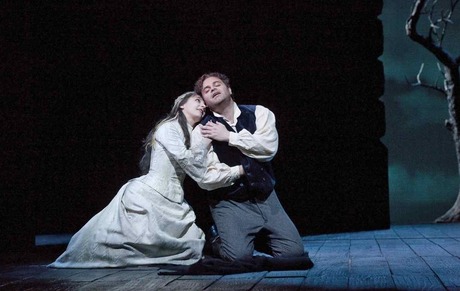Families Duel in Decadent Era in Met's 'Romeo et Juliette'

AFP
In an era of intense political division, the new production of "Romeo et Juliette" at New York's Metropolitan Opera brings the classic tale of warring families to a universe of palpable power and ostentation.
Director Bartlett Sher's vision for the opera, written in 1867 by Charles Gounod, keeps the action in Verona but shifts from the Renaissance to the 18th century -- a decadent world of puffed-up wigs that recall Marie Antoinette and ball gowns in royal reds and purples.
"When I say decadent, I like the wealthy richness of the 18th century as opposed to the earthiness of the Renaissance," Sher said.
Wealth and power are the governing forces set by the warring Capulet and Montague families into which the protagonists are born and tragically die.
"It's about all the things we see within an atmosphere of power and wealth all the time and it's contrasted against the innocence and completely pure experience of these two young lovers, who only want to be with each other," Sher said in an interview with AFP.
The opera, which will be presented in cinemas globally on January 21 as part of the Met's "Live in HD" series, features four major duet scenes between the doomed protagonists, played by Italian tenor Vittorio Grigolo and German soprano Diana Damrau.
It is one of the showpieces of the Met's 2016-7 season, the opera house's 50th anniversary at Lincoln Center and a pitch at broadening the Met's appeal both in New York and beyond. A recent Wednesday night performance was almost completely sold out and included a somewhat more youthful audience than at some other operas.
The Met aims for an "eclectic" menu among the two dozen operas each year and "Romeo" is so far the season's biggest hit, said general manager Peter Gelb.
"The title itself resonates within mainstream culture," Gelb said. "The story is timeless. Blood feuds and love and death, that kind of stuff."
- Parallels to current day? -Sher has been gratified by the positive reception to the opera and suspects the work may also resonate as the United States transitions into its Donald Trump years after a contentious presidential election that sparked plenty of talk of political tribalism with some parallels to the Capulets and Montague.
"There's this incredible anger between the two groups," Sher said.
"What's happened now is we have everything so far apart and no one's found a way to rebuild the trust because the trust is deeply severed and the culture is pulling apart in a way none of us can remember."
Gounod's work was a mainstay of the repertoire in the early days of the Met, although it has ebbed in popularity somewhat in recent decades. Critics sometimes regard the lush score, which includes a kind of recurring "love theme" as cloying, but partisans defend the work as a largely faithful adaptation of a great Shakespeare play, as well as a showcase for star singers.
The opera features the same four scenes that frame the play: ball, balcony, bed and crypt, as well as a Frenchified version of famous Shakespearian lines, such as Mercutio's dying remarks ruing a "plague on both your houses," referring to the civil war between the Capulets and Montagues.
There is also the duel scene between Romeo, Mercutio and Tybolt, elaborately choreographed at the Met and culminating in a rousing choral number that expresses the very Shakespearian theme of how disharmony at the top can corrode broader society.
But the opera also differs from the play in some key ways and "trying to reconcile the two will send you a little bit into the loony bin," said Sher.
Shakespeare aficionados will see that the opera compresses much of the plot and includes virtually none of the rich subplots around secondary characters, such as Juliette's betrayal by her nurse and the moral conundrums facing the friar. Most strikingly, the opera concludes with a final death duet between the two protagonists that is not in the play and tosses Shakespeare's finale featuring the feuding families, which underscores the devastating effects of a society at war with itself.
Sher, who has also directed the work as a play, acknowledges that he misses some of the theatrical elements, but he also sees great merit in the opera.
"There are those parts of it you just can't explore. But you gain things you can't get," Sher said.
"You get an expression through the music that is the equivalent of what Shakespeare is doing and magnifies it 100 times."
Latest News
 King, Bahrain monarch stress need to maintain Arab coordination
King, Bahrain monarch stress need to maintain Arab coordination Security Council to vote Thursday on Palestinian state UN membership
Security Council to vote Thursday on Palestinian state UN membership Dubai reels from floods chaos after record rains
Dubai reels from floods chaos after record rains Khasawneh, Saudi Shura Council speaker discuss bilateral ties, regional developments
Khasawneh, Saudi Shura Council speaker discuss bilateral ties, regional developments Egyptian Foreign Minister condemns potential Palestinian displacement as 'war crime'
Egyptian Foreign Minister condemns potential Palestinian displacement as 'war crime'
Most Read Articles
- King, Bahrain monarch stress need to maintain Arab coordination
- Dubai reels from floods chaos after record rains
- Security Council to vote Thursday on Palestinian state UN membership
- Khasawneh, Saudi Shura Council speaker discuss bilateral ties, regional developments
- Tesla asks shareholders to reapprove huge Musk pay deal
- Jordan will take down any projectiles threatening its people, sovereignty — Safadi
- Hizbollah says struck Israel base in retaliation for fighters' killing
- Princess Basma checks on patients receiving treatments
- Knights of Change launches nationwide blood donation campaign for Gaza
- The mystery of US interest rates - By The mystery of US interest rates, The Jordan Times